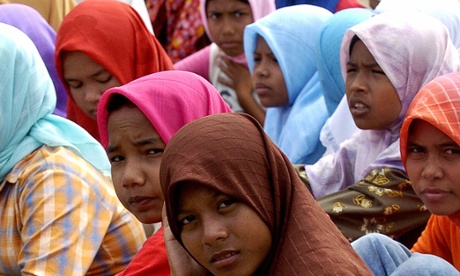
As an Indonesian, I am embarrassed that our society is debating the relevance of the hymen for becoming a police officer, or even graduating from high school.
Two-finger virginity tests are still applied in the recruitment of female officers by the Indonesian National Police. Inspector General Moechgiyarto confirmed that virginity tests are conducted under “health condition requirements” for female police candidates. He argues virginity tests are necessary to prevent sex workers entering the police academy. This test does not apply to male candidates. Virginity tests are also imposed by the military to ensure women who marry military men are virgins.
The city council in Jember, East Java, recently announced that virginity should be one of the requirements for girls to pass high school. Following a public debate, including outrage from Islamic leaders, the plans were dropped last month.
Given such conservative public discourse, are Indonesian women subdued into silence on the issue? No, some are fighting back.
Nihayatul Wafiroh, MP and member of Indonesian Islamic organisation Nahdlatul Ulama, has spoken out against virginity tests. She said: “If people have concerns about free sex among students, don’t just blame them. It’s a complex issue.” She added on her Facebook page that she is asking the ministry of health to abolish virginity tests because they are irrelevant, degrading, and have been condemned by the WHO. Health minister, Nila Moeloek, has avoided the issue, saying it’s a police matter. But she did say: “You could lost your virginity because of accidents, or being raped, and because of these [circumstances] women cannot pursue their dreams to become police?”
Many Indonesians are campaigning against virginity tests through social media with the hashtags #TolakTesKeperawanan and #TesKeperawanan. The National Commission on Violence Against Women also released a public statement urging police to stop the practice.
A group of young LGBT feminists, Bites, ran a public discussion on virginity tests at the end of last year. I was one of the speakers, together with Sri Rumiati, a female police officer, Dr Ramona Sari, a medical doctor, and Andreas Harsono, the Indonesia researcher for Human Rights Watch.
I have been advocating sex pleasure for women through my book The Orgasm Project since 2010. I interviewed 14 Indonesian women from Aceh to Sulawesi about their orgasms. My fear was they would be too shy to answer my questions. I was surprised that they were happy to talk. Most laughed a lot while discussing their orgasms. Nobody had ever asked them about this, not even their partners. They loved answering my questions because, finally, someone cared about their pleasure.
I do this work because I think Indonesian society is a hypocritical. We need to be honest to resolve our issues around teen pregnancy, sexual transmitted diseases, sex workers and discrimination against LGBT people.
Second, I want to offer an alternative and fun way of campaigning for women’s rights. More men than women read my book; finally we are engaging men to talk about women’s issues.
From my research I’ve discovered that women who have orgasms have equal personal relationships, are able to express themselves and, most importantly, are free from violence. I believe women who reach orgasm are empowered and can make decisions about their own bodies, with or without a hymen. Pleasure is a human right. My ambition is for all women to have orgasms, because that’s the ultimate indicator they are empowered.
Firliana Purwanti is the author of The Orgasm Project. Follow @TheOproject on Twitter.
Join our community of development professionals and humanitarians. Follow@GuardianGDP on Twitter.

